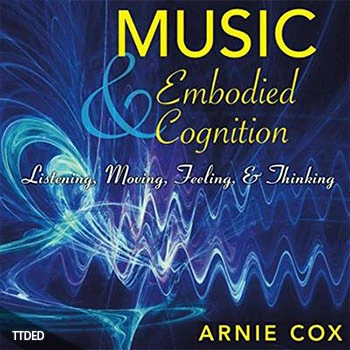 ¥Taking a cognitive approach to musical meaning, Arnie Cox explores embodied experiences of hearing music as those that move us both consciously and unconsciously. In this pioneering study that draws on neuroscience and music theory, phenomenology and cognitive science, Cox advances his theory of the “mimetic hypothesis,” the notion that a large part of our experience and understanding of music involves an embodied imitation in the listener of bodily motions and exertions that are involved in producing music. Through an often unconscious imitation of action and sound, we feel the music as it moves and grows. With applications to tonal and post-tonal Western classical music, to Western vernacular music, and to non-Western music, Cox’s work stands to expand the range of phenomena that can be explained by the role of sensory, motor, and affective aspects of human experience and cognition.
¥Taking a cognitive approach to musical meaning, Arnie Cox explores embodied experiences of hearing music as those that move us both consciously and unconsciously. In this pioneering study that draws on neuroscience and music theory, phenomenology and cognitive science, Cox advances his theory of the “mimetic hypothesis,” the notion that a large part of our experience and understanding of music involves an embodied imitation in the listener of bodily motions and exertions that are involved in producing music. Through an often unconscious imitation of action and sound, we feel the music as it moves and grows. With applications to tonal and post-tonal Western classical music, to Western vernacular music, and to non-Western music, Cox’s work stands to expand the range of phenomena that can be explained by the role of sensory, motor, and affective aspects of human experience and cognition.
金币充值前往“个人中心” 年费VIP 88金币99%的资源免费
资源若失效联系Q或微:Q3185395054,或把文章地址到个人中心提交“工单”

![Ableton Push 2综合视频教程 – Hands On Ableton Push 2 Das umfassende Videotraining TUTORiAL [GERMAN]](https://dd-static.jd.com/ddimg/jfs/t1/171702/20/29268/16684/631dbbb5Ea9e60002/ab3e0fa418689f38.webp)




评论0